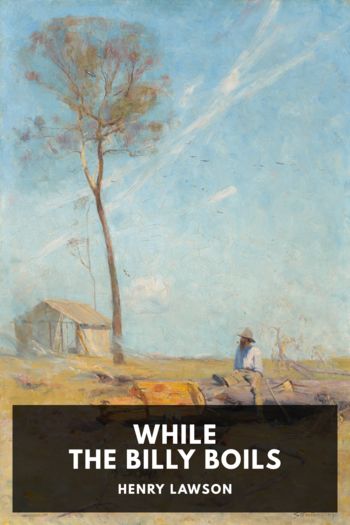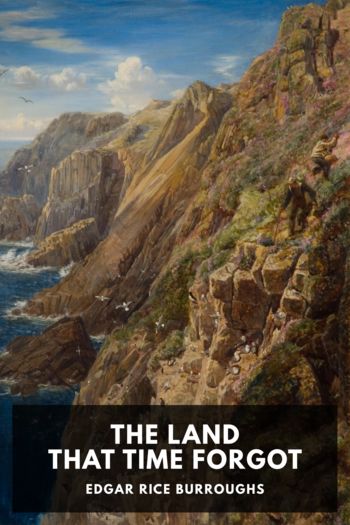While the Billy Boils, Henry Lawson [hardest books to read .txt] 📗

- Author: Henry Lawson
Book online «While the Billy Boils, Henry Lawson [hardest books to read .txt] 📗». Author Henry Lawson
“ ’Give me that pipe!’ she said.
“I said I hadn’t got it.
“ ’Give—me—that—pipe!’ she said.
“I said I hadn’t got it.
“ ’Where is it?’ she said.
“ ’Jim Brown’s got it,’ I said, ‘it’s his.’
“ ’Then I’ll give it to Jim Brown,’ she said; and she did; though it wasn’t Jim’s fault, for he only gave it to me to mind. I didn’t smoke the pipe so much because I wanted to smoke a pipe just then, as because I had such a great admiration for Jim.”
Mitchell reflected, and took a look at the moon. It had risen clear and had got small and cold and pure-looking, and had floated away back out amongst the stars.
“I felt better towards morning, but it didn’t cure me—being sick and nearly dead all night, I mean. I got a clay pipe and tobacco, and the old lady found it and put it in the stove. Then I got another pipe and tobacco, and she laid for it, and found it out at last; but she didn’t put the tobacco in the stove this time—she’d got experience. I don’t know what she did with it. I tried to find it, but couldn’t. I fancy the old man got hold of it, for I saw him with a plug that looked very much like mine.”
He reflected.
“But I wouldn’t be done. I got a cherry pipe. I thought it wouldn’t be so easy to break if she found it. I used to plant the bowl in one place and the stem in another because I reckoned that if she found one she mightn’t find the other. It doesn’t look much of an idea now, but it seemed like an inspiration then. Kids get rum ideas.”
He reflected.
“Well, one day I was having a smoke out at the back, when I heard her coming, and I pulled out the stem in a hurry and put the bowl behind the water-butt and the stem under the house. Mother was coming round for a dipper of water. I got out of her way quick, for I hadn’t time to look innocent; but the bowl of the pipe was hot and she got a whiff of it. She went sniffing round, first on one side of the cask and then on the other, until she got on the scent and followed it up and found the bowl. Then I had only the stem left. She looked for that, but she couldn’t scent it. But I couldn’t get much comfort out of that. Have you got the matches?
“Then I gave it best for a time and smoked cigars. They were the safest and most satisfactory under the circumstances, but they cost me two shillings a week, and I couldn’t stand it, so I started a pipe again and then mother gave in at last. God bless her, and God forgive me, and us all—we deserve it. She’s been at rest these seventeen long years.”
Mitchell reflected.
“And what did your old man do when he found out that you were smoking?” I asked.
“The old man?”
He reflected.
“Well, he seemed to brighten up at first. You see, he was sort of pensioned off by mother and she kept him pretty well inside his income. … Well, he seemed to sort of brighten up—liven up—when he found out that I was smoking.”
“Did he? So did my old man, and he livened me up, too. But what did your old man do—what did he say?”
“Well,” said Mitchell, very slowly, “about the first thing he did was to ask me for a fill.”
He reflected.
“Ah! many a solemn, thoughtful old smoke we had together on the quiet—the old man and me.”
He reflected.
“Is your old man dead, Mitchell?” I asked softly. “Long ago—these twelve years,” said Mitchell.
Coming Across—A Study in the SteerageWe were delayed for an hour or so inside Sydney Heads, taking passengers from the Oroya, which had just arrived from England and anchored off Watson’s Bay. An Adelaide boat went alongside the ocean liner, while we dropped anchor at a respectable distance. This puzzled some of us until one of the passengers stopped an ancient mariner and inquired. The sailor jerked his thumb upwards, and left. The passengers stared aloft till some of them got the lockjaw in the back of their necks, and then another sailor suggested that we had yards to our masts, while the Adelaide boat had not.
It seemed a pity that the new chums for New Zealand didn’t have a chance to see Sydney after coming so far and getting so near. It struck them that way too. They saw Melbourne, which seemed another injustice to the old city. However, nothing matters much nowadays, and they might see Sydney in happier times.
They looked like new chums, especially the “furst clarsters,” and there were two or three Scotsmen among them who looked like Scots, and talked like it too; also an Irishman. Great Britain and Ireland do not seem to be learning anything fresh about Australia. We had a yarn with one of these new arrivals, and got talking about the banks. It turned out that he was a radical. He spat over the side and said:
“It’s a something shame the way things is carried on! Now, look here, a banker can rob hundreds of wimmin and children an’ widders and orfuns, and nothin’ is done to him; but if a poor man only embezzles a shilling he gets transported to the colonies for life.” The italics are ours, but the words were his.
We explained to this new chum that transportation was done away with long ago, as far as Australia was concerned, that no more convicts were sent out here—only men who ought to be; and he seemed surprised. He did not call us a liar, but he looked as if he thought that we were prevaricating. We were glad that he





Comments (0)